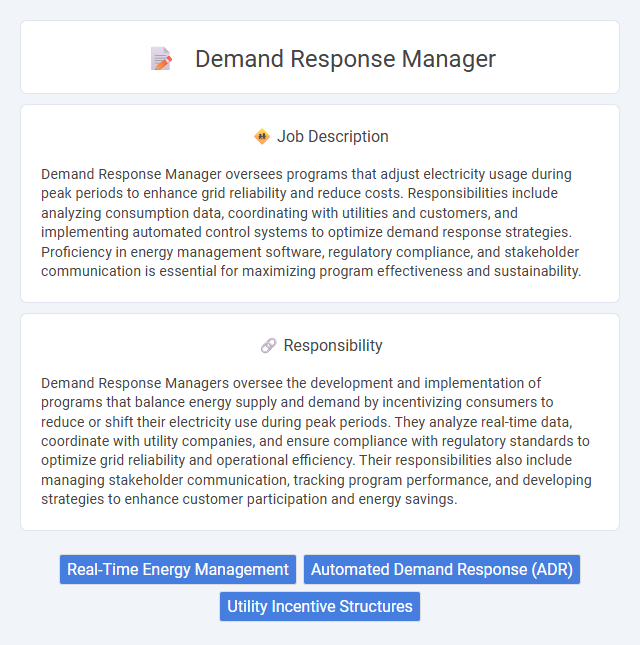
Demand Response Manager oversees programs that adjust electricity usage during peak periods to enhance grid reliability and reduce costs. Responsibilities include analyzing consumption data, coordinating with utilities and customers, and implementing automated control systems to optimize demand response strategies. Proficiency in energy management software, regulatory compliance, and stakeholder communication is essential for maximizing program effectiveness and sustainability.
Individuals with strong analytical skills and a keen interest in energy management are likely suitable for a Demand Response Manager role. Those comfortable with data analysis, real-time monitoring, and coordinating between various stakeholders may find this position fitting. Candidates who prefer structured environments and can handle high-pressure decision-making scenarios might have a higher probability of thriving in this job.
Qualification
A Demand Response Manager typically requires a bachelor's degree in engineering, energy management, or a related field, with strong knowledge of electrical systems and grid operations. Expertise in energy markets, demand response programs, and regulatory compliance is essential to optimize load management and reduce peak demand costs. Proficiency in data analysis, project management, and effective communication skills supports coordination with utilities, clients, and stakeholders.
Responsibility
Demand Response Managers oversee the development and implementation of programs that balance energy supply and demand by incentivizing consumers to reduce or shift their electricity use during peak periods. They analyze real-time data, coordinate with utility companies, and ensure compliance with regulatory standards to optimize grid reliability and operational efficiency. Their responsibilities also include managing stakeholder communication, tracking program performance, and developing strategies to enhance customer participation and energy savings.
Benefit
Demand Response Managers likely enhance energy grid reliability by efficiently coordinating consumer electricity usage during peak demand periods, potentially reducing operational costs for utility companies. Their role may contribute to increased integration of renewable energy sources, promoting sustainability and lowering carbon emissions. Businesses employing Demand Response Managers could experience improved resource allocation and financial incentives through participation in demand response programs.
Challenge
Demand Response Manager roles likely involve navigating complex regulatory environments and integrating diverse energy resources to balance supply and demand effectively. Managing real-time grid responsiveness may present significant technical and operational challenges requiring advanced analytical skills. The position might also demand proactive stakeholder collaboration to optimize demand-side strategies amid evolving market conditions.
Career Advancement
Demand Response Manager roles offer significant opportunities for career advancement by developing expertise in energy market operations, grid management, and sustainability initiatives. Professionals in this field gain valuable skills in demand forecasting, load management, and regulatory compliance, positioning them for leadership roles such as Energy Program Director or Grid Operations Manager. Mastery of demand response technologies and stakeholder coordination enhances prospects for senior management positions within utilities and energy consulting firms.
Key Terms
Real-Time Energy Management
A Demand Response Manager specializing in Real-Time Energy Management oversees the optimization of energy consumption by coordinating demand response events to balance supply and demand efficiently. This role involves utilizing advanced energy management systems and real-time data analytics to adjust load profiles, reduce peak demand, and integrate distributed energy resources. Expertise in grid operations, smart grid technology, and regulatory compliance is essential to enhance grid reliability and achieve cost savings.
Automated Demand Response (ADR)
Demand Response Manager specializes in overseeing Automated Demand Response (ADR) programs that optimize energy consumption by automatically adjusting power usage during peak demand periods. Expertise in integrating ADR technologies with utility protocols and smart grid systems enhances grid reliability and reduces operational costs. Proficiency in data analytics and real-time energy management tools ensures effective load balancing and supports sustainability goals in dynamic energy markets.
Utility Incentive Structures
Demand Response Managers oversee the implementation of programs that incentivize consumers to reduce or shift energy usage during peak demand periods, optimizing grid stability and efficiency. Utility incentive structures often include time-based rates, rebates, and performance-based payments designed to encourage participation and enhance energy savings. Effective management of these incentives drives demand flexibility, reduces operational costs, and supports renewable energy integration.
 kuljobs.com
kuljobs.com